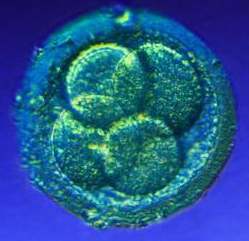 On this, the third day of Christmas, I have been thinking about the incarnation of God's unique eternal Son. His enfleshment. St. John wrote: The Word became flesh and made His dwelling among us.
On this, the third day of Christmas, I have been thinking about the incarnation of God's unique eternal Son. His enfleshment. St. John wrote: The Word became flesh and made His dwelling among us.
One of the greatest turning points in history was the moment when God became a man. But really that is not the Christmas event.
Christmas is about the Nativity of Jesus. "Nativity" comes from the Latin natus or "birth." If one is a native of a place, it means he was born there. The Son of God become a native of planet earth. And Christmas is the celebration of that fact.
But I am talking about his incarnation, his enfleshment. God did not become a man in Bethlehem in the cattle stall overlooked by shepherds and angels. No, that happened approximately nine months earlier, presumably when the angel named Gabriel announced to Mary that she would conceive and give birth to a child.
It seems to me that we put so much emphasis on the birth of Jesus, but too little upon his conception. You might say that the birth implies the conception. But this is a very important point I am trying to convey. God became a zygote.
Some modern churches have altered the words of the Nicene Creed to become more politically correct, and in so doing have sold their souls for a mess of pottage. The traditional English translation states that the Son of God "became man." In order to avoid the appearance of male chauvinism, some have rendered this instead as "became fully human." That is a very unsatisfactory translation. I understand the purpose. By "man," we do not mean to imply that the incarnation does not benefit people without penises. So we say Jesus became a human being. And that is true enough. The trouble is with the phrase "fully human." Fully Human? What other options were there? Could the Son of God have entered the world as a partial human? A potential human? Maybe a cyborg or a chimera? The phrase "fully human" implies that there are degrees of being human and that is impossible for a Christian to believe. In the words of Frederica Mathewes-Green:
You see, there are ethical implications for what we believe as Christians. It is not possible to take seriously the incarnation of the Son of God while tolerating abortion. Read that sentence again. Read it twice because anyone who denies the true humanity of Jesus is in serious danger.
I believe that God loves each and every created person. I believe that we begin when our bodies begin; that each person lives the curve of a continuum, that the eighty-year-old grandmother sitting in a front porch rocker, holding her grandbaby in her lap, is the same person she was when she was sixty, when she was forty, when she was twenty, when she was eight, when she was three. She's the same person over all that span, the same Mildred, whether that whole person is contained in a body the size of an adult, or adolescent, or child or baby. She was the same person when she was one year old, and on the day she was born, two months before she was born, five months before she was born, and in the very moment she was conceived, when her parents' sperm and egg fused. That single cell was a complete human body; in that cell was contained all the genetic information she'd need for a lifetime. That cell was human, it was alive, and it was unique; its DNA was different from her mother's and her father's, a brand new human never before seen on earth. All that was there in that single cell, and its life is a continuum from that moment until the moment of her natural death.
I believe that where there is a living body, there is a soul. There is no such thing as a living body without a soul; I've never encountered such a concept outside zombie movies. You can't, therefore, say that this living, unique human body suddenly becomes a person at six months gestation, or at birth, or some other time. Where there is a living human body, there is human life.
St. John wrote that anyone who denies the incarnation of the Son of God is the antichrist. "Many deceivers, who do not acknowledge Jesus Christ as coming in the flesh, have gone out into the world. Any such person is the deceiver and the antichrist (2John:7)."
A person who accepts abortion must reason that the object being removed from the woman is non-human or somehow less than human, otherwise it is clearly murder. A Christian, however, believes that God became flesh at the point of conception and this confirms for us the tenet that a zygote is a human being.
I don't see how anyone can, in good conscience, celebrate Christmas without opposing abortion.
See also Dr. Nigel Cameron's article Bethlehem's Bioethics. Sphere: Related Content




